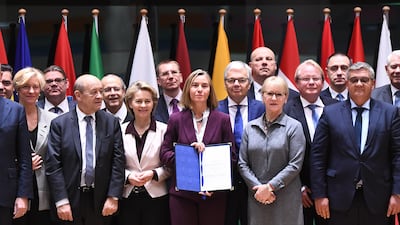Europe vowed to turn a new page on security cooperation on Monday as 23 states came together to sign a mutual defence pact designed to transform military operations.
With a focus on reacting and defending against Russian aggression, the new set-up effectively gives Brussels a formal role in the overall strategic defences across the continent.
The adoption of the Permanent Structured Cooperation on Defence agreement (PESCO) comes as the British negotiate their exit from the EU, removing London’s opposition to structures that rivalled NATO.
_______________
Read more:
EU takes step towards closer defence co-operation
Russian involvement in Brexit vote revealed by Twitter data analysis
No second referendum on Brexit at ‘this stage’ says former PM
_______________
Germany and France have backed plans to reboot EU defence operations, including an announcement in June of a 5.5-billion euro European Defence Fund.
By working together on joint projects, nations hope to use their combined spending power to overcome capability gaps, jointly buying equipment like air transporters or drones.
“Today we will launch a new page for the European Defence," said Frederica Mogherini, the EU’s foreign and defence policy representative. "The real problem is not how much we spend, it is the fact that we spend in a fragmented manner.”
In all just five member nations failed to sign up to the process, known as permanent structured cooperation, or PESCO. Denmark has a defence opt-out from EU treaties while Portugal, Ireland and Malta have not made a formal decision to join.
Defence experts said the success of the new project would only be clear when Paris and Berlin resolved their competing visions for European-wide military cooperation.

“It will primarily depend on France and Germany’s ability to address short term technical issues, such as the definition of ambitious projects and the monitoring of the countries’ commitments, and to focus on the concrete military effects of this initiative,” said the European Leadership Network think tank in a research note.
France was initially keen for a smaller group of nations that would more readily commit to possible foreign interventions such as in Libya or Mali.
Germany wanted as many countries as possible to sign up but wants to keep the focus on more modest schemes. Frederic Mauro, a defence expert who advises the European Parliament, said he was “deeply sceptical” about the final form of the pact, describing it as “light years” away from the concept of defence cooperation foreseen in EU treaties.
“The Germans say respect unity and proceed modestly at the start with all these little projects — they won’t help the EU’s independent capacity,” Mr Mauro said. “It has no chance of working.”
Ministers attending the signing ceremony made clear that while the arrangement would not replace NATO, it was a product of concern over America’s shifting foreign policy.
President Donald Trump berated European partners on military spending at a NATO summit in May.
“It was important for us especially after the election of the American president that we can organise ourselves independently as Europeans,” German Defence Minister Ursula von der Leyen said. “This is complementary to NATO but we also see that nobody will solve the security problems that Europe has in its neighbourhood — we have to do it ourselves.”
Mrs Mogherini said the move would not only complement Nato's security aims but fill in gaps in the Atlantic alliance. The EU, she said, has tools to fight hybrid warfare — the use of conventional weapons mixed with things like propaganda and cyber-attacks — that the American-led military alliance does not have at its disposal.
She added the EU countries could bring political and financial clout to bear on security challenges, such as the use of development aid in Africa, where NATO has no real foothold.
Ultimately Pesco could be overseen by a European operational headquarters or logistics base. At launch the focus will be project-driven such as the development new military equipment such as tanks or drones.
The agreement commits countries to “regularly increasing defence budgets in real terms” as well as devoting 20 percent of defence spending to procurement and two percent on research and technology.
Mrs Mogherini said that by coordinating their efforts, European countries would get better value for money in defence.
British officials held open the prospect of cooperating with the pact on a case-by-case basis. “We are leaving the European Union but not Europe, and regional security remains top of our agenda in the face of increased Russian assertiveness,” said Lord Howe, the defence minister.

